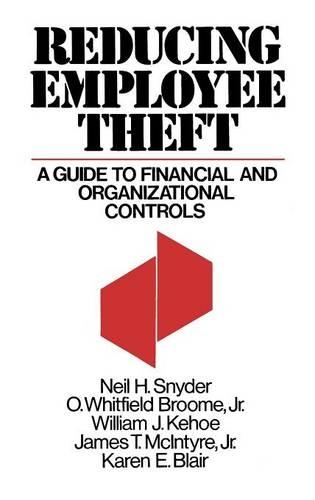
Reducing Employee Theft: A Guide to Financial and Organizational Controls
(Hardback)
Publishing Details
Reducing Employee Theft: A Guide to Financial and Organizational Controls
By (Author) O Whitfi Broome
By (author) Karen E. Blair
By (author) William Kehoe
By (author) James Robert McIntyre
By (author) Neil H. Snyder
Bloomsbury Publishing PLC
Praeger Publishers Inc
25th July 1991
United States
Classifications
Tertiary Education
Non Fiction
Causes and prevention of crime
658
Physical Properties
Hardback
216
Description
Employee theft is one of the most pervasive problems faced by businesses today, and it continues to escalate at an estimated rate of 15% per year. This volume presents a full-length guide to the alternatives available to companies seeking to reduce both the actual theft of tangible property and the profits lost through cheating on time cards and expense accounts. The authors offer an in-depth discussion of the safeguards employers can implement, ranging from internal controls to physical security measures, and develop a comprehensive theft reduction strategy aimed at creating a working environment that discourages theft. They also address the legal and ethical problems arising form theft control issues as well as the question of equiry in the workplace. The authors agree that a plan for reducing employee theft can only be successful if it focuses on making the work environment unattractive to theives rather than on simply catching theives. They offer a practical theft reduction strategy, based on techniques that have proven successful in a variety of firms, that begins with the recruitment process and reaches into every aspect of business operation. In their concluding chapter they discuss what to do when a thief is identified. Five appendixes provide additional information including a guide to hiring and keeping good employees, a study of employee theft by Virginia's Crime Prevention Manual Task Force, an examination of what motivates employees, an internal controls checklist and a list of dos and don'ts in dealing with employee theft. Human resource managers, small business owners, and executives in large corporations should find this volume an invaluable asset in their efforts to confront the growing problem of employee theft.
Author Bio
NEIL H. SNYDER is the Ralph E. Beeton Professor of Free Enterprise at the University of Virginia's McIntire School of Commerce and director of the school's Center for Entrepreneurial Studies. He is the author or co-author of six previous books and numerous articles on strategic management issues. O. WHITFIELD BROOME, JR., is a professor and Director of Graduate Studies at the McIntire School of Commerce of the University of Virginia. He is also a CPA. WILLIAM J. KEHOE is the Consumer Bankers Association professor and associate dean at the McIntire School of Commerce of the University of Virginia. He is the author or co-author of three books on marketing and ethics issues. JAMES T. McINTYRE, JR., is an attorney with McNair and Associates in Washington, D.C. He served for three years as director of the Office of Management and Budget and as a member of President Jimmy Carter's Cabinet. KAREN E. BLAIR attends the University of South Carolina School of Law. She is a 1987 graduate of the McIntire School of Commerce of the University of Virginia.
